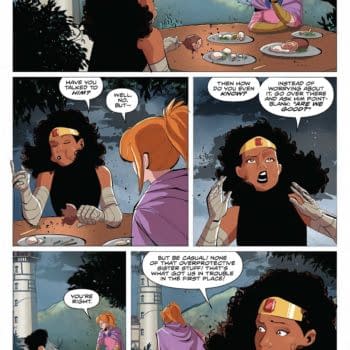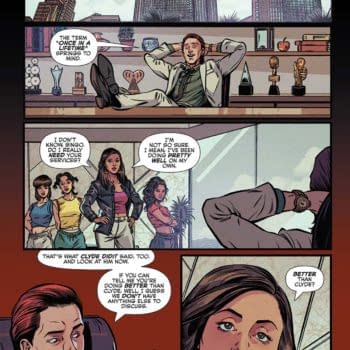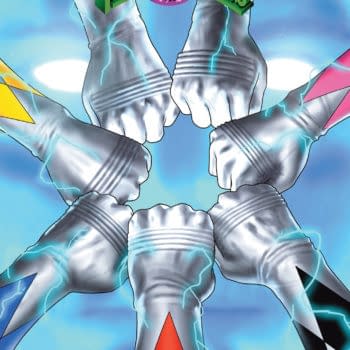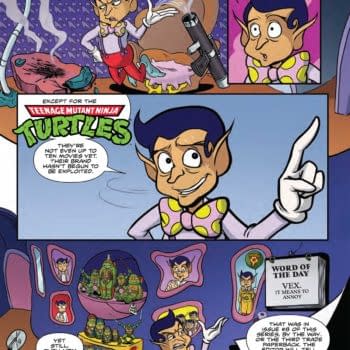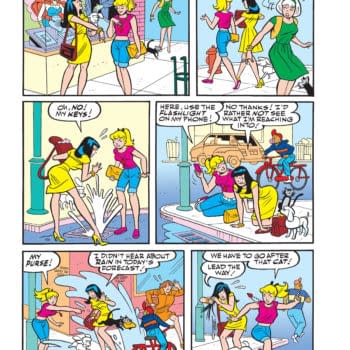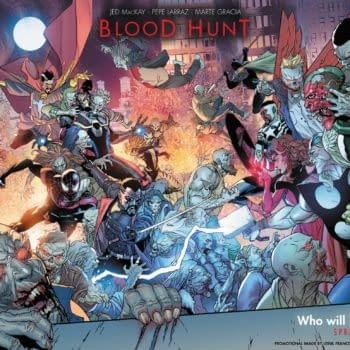Posted in: Comics, Recent Updates | Tagged: Comics, entertainment, scott snyder, sean murphy, The Wake, vertigo
The Big Question Is Do We 'Go Forth And Explore'? Scott Snyder Teases The Wake's Final Issue
I try to decide now, looking back, what made me pick up the first issue of The Wake from Vertigo. The interesting logo caught my attention, the edgy color schemes of orange and yellow around it, the covers that suggested something lurking under the surface of dark waters, and I come back to the allure of the ocean and the effect it's always had on me. As a kid, I was a competitive swimmer, and spent a lot of my time in water training on national and summer teams, and it seemed like my natural element.

When I talked with Scott Snyder recently about the series' move toward its final issue, a lot of what he said resonated with my initial feeling of pull toward the comic. He said:
On the one hand, for me, it's meant to be in some ways a coherent sci-fi series, but it always had this big circular plot that would come back and explain things. And I knew that the [final] issue would be an issue that filled in the gaps.
But ultimately, the more important thing about the series is that it's meant to be something that surprises you every issue and does things you're not expecting every issue and goes to a place you least expect it to, so that you leave the issue thinking, "I can't wait to read the next one because it broke my expectations of what was coming".
Picking up The Wake's first few issues defied expectations consistently and turned into something a lot more than nostalgia for me. I had a very different but related sense of encountering something both familiar and alien. The world of the comic gave me a strong identification character, Lee, and more with the strange anthropological angles that chimed with my other areas of interest—ancient cultures and folklore. It was safe to say that this was a comic that was right over the plate for me. But I was never comfortable as a reader because that wasn't what it was about, as Snyder's statement confirms.

I learned from Snyder that there was a constant challenging push and shove between them working on the comic that resulted in this "tension" I was noticing and intrigued by in the text:
That was always the challenge with Sean, when we signed up to do the book together. That was always our goal, our pact really together, and we've pushed each other in a way that's been really fun, where the craziest scenes in the book half the time are things that he'll dare me to put in or that I'll dare him to put in.
So, for example, in issue #9, her [Leeward] riding the dolphin down the avalanche. That was Sean's idea. I was saying, she'll be going down, escaping the avalanche, driving the truck, and he said, "Put her on the dolphin". And I said, "How on earth are you going to get a dolphin up a mountain?" And he said, "Just put him in the truck with water and I'll figure it out". And I said, "All right, all right". And then I had to figure out a way to make it make sense.
Similarly, I said, "Well, we have these pirates, and I want them inside a creature, so it evokes the Nautilus. I want the teeth to be ice-chompers. And I need some kind of drone. Draw a parrot drone". And he was like, "All right, all right". We've gone back and forth in a really fun way.
I don't think I could put my finger on it then, but the atmosphere was unnerving—it was both intensely real and intensely resistant to interpretation at the same time as the plot unwound, hinting at ancient, primitive glimpses and confrontations with mermen, strangely advanced technology, and time after time moments of "encounter" that focused on eyes—human and inhuman. Things staring back at each other and making you wonder who was the most imponderable. The sea, somehow, makes sense, but do, we, as humans, make sense in the way that we encounter the unknown with predominant violence? But the mermen of The Wake were savage too, it seemed, fanged and dangerous, creepily intelligent, relentless, and sure to "win" in a survival of the fittest, particularly on their own turf.

Our new cast of characters had a tenuous thread of connection to the past in the way of radio signals and that same driving need for information pushing them forward, but most of the characters seemed to be turning away. Too much time had passed to solve the equation, and things were being lost like a new dark age. Which made it seem a little cruel that the comic made you care about Leeward and her sonic dolphin because there was a doomsday sense of a loosening grip on the past, a new era of brutality was winning out. But in that churning detritus being cast up from the past there were some haunting fragments—songs, names, traditions. Just enough to keep characters like Leeward going. But what were they headed for?

Snyder explicated:
It's meant to speak to the fact that I think we all do feel sometimes that the truths that are out there about how we came to be, the truths that are out there about how little we mean or how much we mean, those are these huge inscrutable and impenetrable elements in the world. We can do what we can to figure out tiny pieces of those truths, but they are terrifying.
Issue #9 of The Wake brought things to a head. It drew up a new opposition between characters who were delving into the past to try to recover something—perhaps their sense of self—and characters who wanted to create a new order of making due with less. For them, forgetting would make the world more tameable. A certain pragmatism at the other end of a gun bringing a little military rule, actually, may not seem like the worst thing in a post-apocalyptic world. If it hadn't been for those who felt uneasy, that it wasn't the right choice somehow. And encouraged the reader to feel the same.
Sean Murphy's consistently impactful narrative spreads helped place humans in the frame of their own history as a species and also kept pulling us back like an insistent reminder of…something. What, we weren't sure. In issue #9 Leeward becomes increasingly visionary, operating in a dreamy way herself, having a widespread effect on others who, having nothing left to lose, decide to follow that unusual tune, that little fragment of a melody that resists the general tide of things. And they look for their answers. Not without cost. But even you, with so little left of a world worth living in might make that decision to go further into the mystery. What Leeward finds at the end of issue #9 rips things apart in that it peels the veneer off ambiguity in the story and you become sure that it is better to know than to forget and to follow things to the ends of the earth if necessary to recover even a fragment of lost hope.
Snyder explained:
You'll never know the things you wish you could know, but it's that feeling of terrifying curiosity, that feeling of "Do I want to look past the boundaries of my own familiar existence, and the things that I'm comfortable with? Do I want to explore and go further than I feel comfortable with, or not?"
The book is saying that, and has always meant to speak to that kind of question. Do you retreat and deny that curiosity and protect what you have an cling to that, or do you venture out, and in venturing out, know that you'll probably never get close to the place you want to? The attempt itself is the victory. That was always the stuff that Sean and I talked about before we began.
I think that the revelations in issue #9, although they aren't spelled out fully yet, and so we wait for the finale in issue #10, make the second arc of the story that much darker in retrospect. Not in a classic sense of being violent and macabre, but just that you begin to realize how devoid of…something…the world of The Wake became post-flood. Once you know what's been missing, you can see it and grasp that it was like someone having an astonishing and illuminating dream that helps them make sense of their lives and then getting busy and distracted and forgetting it entirely. Just that nagging sense lingers—that void in the memory for them.
When I reviewed issue #9, I said the series was getting "scarier" and "scarier" as it moved toward finale, and now I feel I understand better why I said that. The sense of having forgotten something was getting stronger and stronger, and there was a sense of something immense lurking under the surface of things getting closer and closer, more definable in its surface tension than in its shape or essence at that point. The final panel of issue #9 breaks that tension in shattering ways and a frightening light dawns, making things unrecognizable again. This book is all about how the world changes based on even a tiny amount of knowledge that they've hunted down at great cost. And what effect that change has on people, what it makes them capable of, and the choices they make to forget or remember when remembering means immense change.
Snyder's final hint is that:
It's important to me that readers walk away feeling emotionally satisfied, and intellectually, with [The Wake]. It's meant to be a book that says, "Go forth and explore". It's meant to be defiantly exuberant, the whole book, in its own way.
It's almost as if the world of The Wake gets wilder and stranger, too, looped into that exuberance, as Leeward moves toward this moment, with electronic parrots, water pods for her transported dolphin, and of course, the descent into the cave and its wall-paintings. We see her as a new primitive given new choices. So a lot rests on her reaction, and her future in terms of the final "message" of the series. Assuming she survives, what kind of world will Leeward inhabit? It seems to all depend on how much she knows about the past, the rise of the mermen, and whether knowing these things, she will still choose to regress into an easier mode of existence or, as the reader is encouraged relentlessly to do in The Wake, "Go forth, and explore".
Many thanks to Scott Snyder for the insights, and really, could it seem any longer until July 30th when we get our hands on this final issue?
Hannah Means-Shannon is EIC at Bleeding Cool and @hannahmenzies on Twitter












